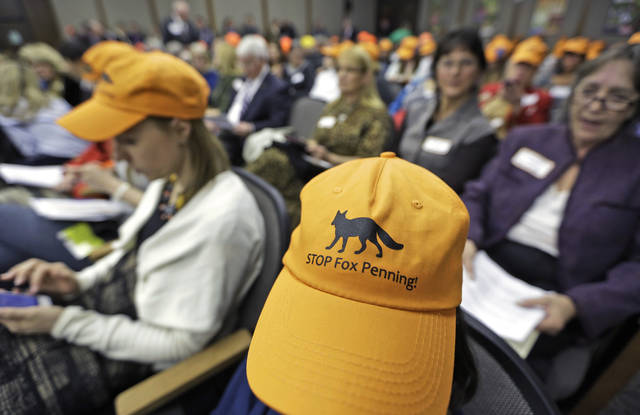RICHMOND, Va. — A two-year investigation has led to the closure of six of Virginia’s nearly 30 fox pens, large enclosures in which wild foxes are contained and chased by hunting dogs, Attorney General Mark Herring’s office said.
Herring’s office told The Associated Press ahead of an official announcement Wednesday that its Animal Law Unit had secured nine guilty pleas from people involved in a sweep targeting fox pens stocked with illegally purchased wildlife.
Six pens lost their licenses as a result. They are among the first licenses to be revoked since the passage of a 2014 law intended to phase out the controversial practice, Herring spokeswoman Charlotte Gomer said.
“Any individuals who participate in activities like wildlife trafficking or illegal fox penning should be brought to justice,” Herring said in a statement.
Supporters say the facilities, which are required to have an escape for the foxes, provide a safe way to train hunting dogs. But animal welfare groups and other opponents argue the pens are cruel to the foxes, which are sometimes killed, and say they don’t have a true element of fair chase like a hunt in the wild.
Some compare fox penning to dog fighting. Herring’s office said the practice sometimes deviates from a training exercise to include gambling or competitions to see whose dog can catch the confined fox.
The 2014 law made erecting or maintaining such a pen illegal, though it grandfathered in existing facilities that will eventually have to close.
As of Tuesday, there were 29 permitted fox pens in Virginia, mostly in the south-central part of the state and Tidewater region, said Bob Duncan, executive director of the Department of Game and Inland Fisheries. They range in size from a minimum of 100 acres to 600 or 700 acres, he said.
Fox hunting is a centuries-long tradition in the state, but fox penning emerged in the 1980s as a way to eliminate damage from hunts running through crops or animals being killed along highways, Duncan said.
“These things have become hugely popular,” he said. “People travel all across the Southeast and even across the country to train dogs and run dogs.”
The nine people who pleaded guilty in the investigation were charged with illegally purchasing wildlife and received suspended sentences of varying lengths. Some faced fines.
The purchase and sale of wildlife is generally prohibited in Virginia, although pen owners may contract the services of a trapper to purchase a certain number of foxes a year, with a fee that’s supposed to be based on the trapper’s time and effort, Duncan said.
“These convictions clearly demonstrate the cruel, inhumane nature of fox penning and the illegal activity that can accompany it,” Matthew Gray-Keeling, Virginia state director for The Humane Society of the United States, said in a statement. “We sincerely appreciate Attorney General Herring’s work to strictly enforce Virginia’s laws and shut down these illegal and inhumane operations.”
Kirby Burch, chief executive officer of the Virginia Hunting Dog Alliance, said he was glad to see people being punished for dealing in illegal wildlife.
But Burch added that he hoped the preserves could eventually reopen, saying it was unfortunate that a handful of violators were shining a bad light on a sport he said many of his organization’s approximately 90,000 members enjoy.
The pens that lost their permits are in Buckingham, Lunenburg, Appomattox, Dinwiddie, King and Queen, and Brunswick.
All six are currently shut down, Gomer said. Two of the pens are precluded from reopening, and the other four could choose to appeal and the pens could operate pending the outcome, though that has not happened, she said.


